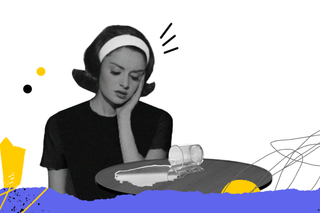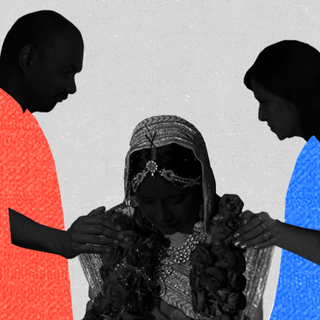
Is This Normal? “I Apologize To Inanimate Objects”
My over-apologetic nature and my tendency to attribute human traits to objects contribute to why I say “Sorry!” to inanimate things.

In this series, we dig into our strange phobias, fixations, and neuroses, and ask ourselves — Is This Normal?
I stepped on a doormat last week and immediately felt so apologetic I blurted out a quick “I’m so sorry” before my brain even had the chance to process that doormats are, well, meant to be stepped on. It wasn’t, however, the first time I’d apologized to an inanimate object — almost like a reflex reaction to the thought that I may have accidentally hurt it.
To me, the reason for doing this is pretty simple: if I collided against a human being, I would apologize to them, right? So, “if you make a mistake or hurt someone, you apologize” became a habit over time. Moreover, as an autistic person, I struggle with proprioception — defined as the “perception or awareness of the position and movement of the body.” This resulted in me having poor balance. And the more I fell or bumped into living and non-living things, the stronger this habit of apologizing became — so much so that I can barely even distinguish whether something is living or non-living before going “Sorry!”
I’m accidentally knocking things (if not people) over around my house round the clock. And as you can imagine, over the years, “sorry” has probably become the “most used” word in my vocabulary.
Is this normal? Turns out, yeah, kind of.
For starters, I, like countless other women, am an “over-apologizer,” in general — besides being over-apologetic to inanimate objects, that is. According to researchers, across cultures, this gender gap in apologies results from men having a higher threshold for what constitutes offensive behavior, and therefore, requires an apology. Women care more about how their actions emotionally affect people around them, so they have a lower threshold for what needs an apology. This difference manifests because of, well, gender stereotypes — “girls are more often rewarded for focusing on others’ feelings while boys are more often rewarded for asserting themselves,” Dr. Stephen P. Hinshaw, psychologist, had explained.
Additionally, if one grew up in a household where conflict led to screaming or violence, they tend to become over-apologizers. Similarly, while growing up, if one experienced being iced out and given the cold shoulder every time a conflict arose, a fear of abandonment is instilled, which manifests as over-apologizing well into adulthood.
Experts believe that anxiety can also lead people to over-apologize — well, that checks out for me. “Over-apologizing can stem from being too hard on ourselves or beating ourselves up for things,” Juliana Breines, an assistant professor of psychology at the University of Rhode Island, notes.
Related on The Swaddle:
Why We See ‘Human Faces’ in Objects Sometimes
But, besides anxiety, another mental health condition that can turn people into over-apologizers is obsessive-compulsive disorder (OCD). According to Michael Alcee, a clinical psychologist, “people with OCD are often very sensitive about harming others and about exhibiting overly-assertive or aggressive thought or action.” By apologizing profusely, they believe they’re “undoing” any harm they think they have caused.
However, the “weirdness” embedded in my behavior isn’t just that I over-apologize, but that I struggle to fight the urge to do that to inanimate objects as well. I’m not the one that thinks this is “weird” — it’s people around me who have seen me do this, who found my behavior odd.
Then again, I often talk to inanimate objects as well — not sure if that makes it less or weirder, but attributing human traits, emotions, or intentions to non-human entities is an actual thing. It’s called anthropomorphism, and scientists link it to social intelligence and higher empathy. Phew!
Not only that but there’s also an evolutionary explanation for the phenomenon. Face pareidolia, or the human tendency to see faces in inanimate objects, is a driving factor for anthropomorphism. It is simply an extension of our ability to read faces and expressions. It helps us distinguish between friends and potentially deadly foes. It’s just that for some of us, anthropomorphism happens to be more pronounced.
Moreover, if I’m being honest, quite often, I’d rather not take back an apology I blurted reflexively simply because the subject of the collision turned out to be non-living. I mean, if I can talk to them, then why wouldn’t I apologize for putting them in harm’s way? I’d not want them to feel like I don’t care about their feelings, after all.
Research suggests that anthropomorphism often acts as a coping mechanism to deal with social isolation. In fact, two different studies found strong links between loneliness and anthropomorphism. Given that I grew up as an only child and hardly had any friends in my formative years due to my challenges with socializing or even communicating effectively, it makes sense that I began treating inanimate objects as replacements for human contact. To be frank, I think that’s a choice I’d still love to make.
Could it be that my tendency to apologize to non-living things is a combination of my over-apologetic nature and my propensity to anthropomorphize? I will meditate on this as I clean up the water I just spilled on my desk — while apologizing to the glass for knocking it over with my elbow, and the table, for wetting it.
Devrupa Rakshit is an Associate Editor at The Swaddle. She is a lawyer by education, a poet by accident, a painter by shaukh, and autistic by birth. You can find her on Instagram @devruparakshit.
Related


It’s Okay: To Not Forgive and Forget
